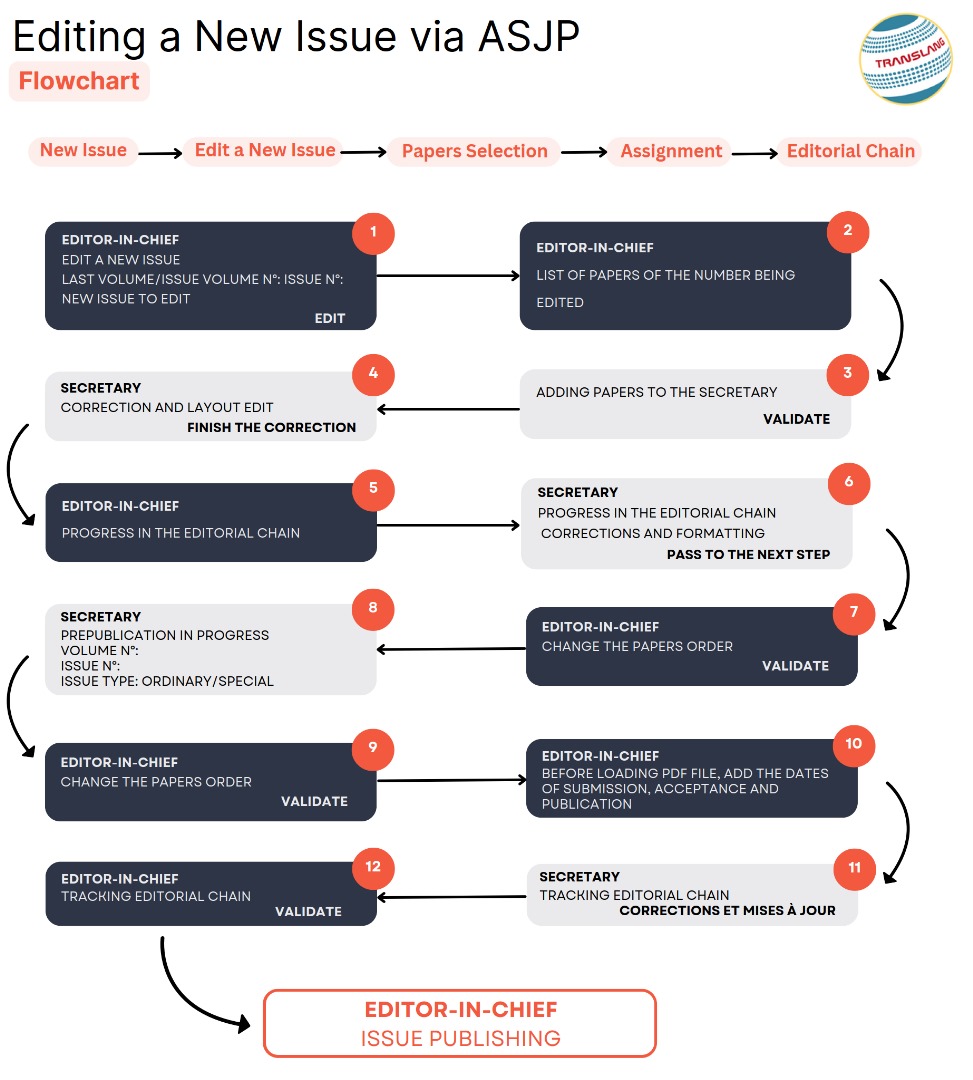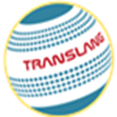Responsibilties& Qualifications of Editors and Reviewers
Traduction et Langues Editorial Board Team
Editorial Board Teams
The editoroal board of Traduction et Langues comprises three teams, namely the executive board members, the advisory board members, and the Reviewing board members. An up-to-date list of committee members, including their professional affiliations, must be displayed on the journal’s websites twice a year (ASJP & OJS). The next update will be on December 20, 2024.
Additional Notes
Senior Associate Editors are invited via ASJP since they collaborate with other Algerian journals on the Plattform of Algerian Scientific Journals, their integration into the list of Editors on the OJS site of Traduction et Langues is determined by the degree of their involvement in our journal activities and their fulfillment of the tasks allotted to them. Starting from January 2025, all the Editorial Board of Traduction et Langues members must adhere to the same editorial policy.
All researchers interested in joining the editorial board of Traduction et Langues are required to thoroughly read the journal's editorial policies and the Publication Ethics and Malpractice Statement. They must also sign the Consent Form(s) before formally accepting the invitation through ASJP.
Executive Board Team
The Executive Editorial Board is the effective team of Traduction et Langues. Members of this editorial committee are the ambassadors of our journal. Editorial members are not compensated for their work with our journal, their contribution reflects their commitment to Open Access Research and highlights their adherence to the COPE recommendations of Publication Ethics and Malpractice. This editorial committee consists of 11 distinguished researchers in Translation and Language Studies, including 6 women and 5 men affiliated to different scientific institutions. This committee determines its communication methods, especially via ASJP, emails, and professional networks like LinkedIn, Academia, and Research Gate. WhatsApp has been deemed essential since 2023. It establishes and validates Traduction et Langues editorial renewal and operating publication policies, including tasks and responsibilities displayed on the journal’s websites before the release of each issue during the year. This editorial committee must function as a team and ensure the workload is not carried by a single person. Led by the Editor-in-Chief, this committee makes key decisions regarding:
- ◉ Defining the journal's strategic direction;
- ◉ Approving Special Issues and appointing Guest Editors and Lead Guest Editors;
- ◉ Validating editorial board members, with renewals occurring two to three times a year ( mainly June and December);
- ◉ Promoting the journal’s diversity and maintaining the high quality of its content as well as its integrity.
Advisory Board Team
Members of the advisory editorial board of Traduction et Langues act as guarantors and advisors to the executive committee but do not hold operating responsibilities. Their mission includes supporting and assisting the executive and the reviewers' committees by proposing Special Issues and inviting distinguished scholars to contribute to TRANSLANG Journal. Only members acting as Associate Editors and Reviewers participate in the reviewing process, ensuring high-quality publications. The committee consists of a large number of distinguished scholars in our journal’s fields, affiliated to diverse institutions in the world. Associate Editors are invited via ASJP to join the editorial board of our journal, their acceptance is consent to adhere to the Traduction et Langues requirements and policies. Starting from November 2024, all members of the Editorial Board must sign a consent form before joining our journal via ASJP. Applications must be validated by the executive committee. The members of the editorial boards are requested to respect TRANSLANG statements.
Traduction et Langues executive board recognizes the crucial role that our editorial board members play in maintaining the quality and integrity of our journal. To ensure that we have a team of highly qualified and dedicated professionals leading the academic direction of our publications, we have established specific qualifications and requirements for potential editorial board members.
Responsibilties& Qualifications of Editors
As a member of Traduction et Langues editorial board, you will play an essential role in shaping the future of our journal. Editorial board members are responsible for ensuring the quality and relevance of our content while contributing to the journal's strategic direction and development.
Associate Editors
Responsibilities of Associate Editors
- ◉ Provide Guidance on our journal policies, scope, and strategic direction.
- ◉ Keep informed about our journal's policies, guidelines, and any changes or updates.
- ◉ Share your expertise in the field of translation and language studies to support the journal's editorial direction;
- ◉ Actively promote the journal within your professional network and encourage high-quality submissions;
- ◉ Propose and lead Special Issues as a Guest Editor to highlight new trends or key topics in the fields of our journal.
- ◉ Assess proposed Special Issues to ensure their relevance and alignment with the journal's scope.
Qualifications of Associate Editors
- ◉ At least 4 years of research or professional experience in the relevant field of our journal.
- ◉ A minimum of 5 publications related to the major topics of our journal.
- ◉ Preference will be given to applicants who hold the rank of Full Professor or Associate Professor or occupy an equivalent position in the fields of Translation and Language Studies.
- ◉ Editorial experience or similar roles in academic publishing are considered.
Senior Associate Editors
Senior Associate Editors play an important role within the editorial team, assisting the Editor-in-Chief in leading and representing the journal. They work closely with other academic editors and the editorial office to uphold the journal's standards and reputation.
Responsibilities of Senior Associate Editors
- ◉ Solicit manuscripts within a specific subarea of the journal.
- ◉ Assist in the selection and management of reviewers.
- ◉ Collaborate with conference organizers to support the journal’s content.
- ◉ Help build and maintain a network of reviewers for efficient manuscript processing.
- ◉ Monitor the journal's performance and statistics to ensure its ongoing progress.
Qualifications of Senior Associate Editors
- ◉ A doctoral degree.
- ◉ Sufficient time flexibility to fulfill the journal's promotion.
- ◉ Excellent proficiency in one of the languages of our journal.
Reviewers Board Team
Reviewers are an essential part of the peer review process, entrusted with ensuring the quality and integrity of scholarly content. They are expected to offer fair, impartial, and timely evaluations of submitted manuscripts. Reviewers remain anonymous and are recommended and invited by Associate Editors through ASJP or directly appointed by the Editor-in-Chief. Associate Editors may also serve as reviewers.
Responsibilitiies& Qualifications of Reviewers
Responsibilities of Reviewers
- ◉ Evaluate the manuscript’s scientific quality based on their expertise.
- ◉ Provide thorough, detailed review reports and stay committed throughout the review process.
- ◉ Maintain the highest ethical standards, avoiding personal, financial, or intellectual biases, and focus solely on the research quality and presentation.
- ◉ Keep all manuscript details confidential, refraining from disclosing or using unpublished content without prior consent.
- ◉ Keep your affiliation up to date in the reviewer account via ASJP to help editors identify any potential conflicts of interest.
- ◉ Complete reviews on time, and communicate promptly with the editorial team if an extension is needed.
Qualifications of Reviewers
◉ At least 3 years of research or professional experience in the relevant field of our journal.
◉ A minimum of 3 published works on topics related to the journal’s scope.
◉ Holding a doctoral degree.
◉ Experience in peer reviewing is an added criterion.
Editorial Office
The Secretary plays an important role in the editing and publishing workflows, particularly in collaborating with the Editor-in-Chief to achieve the process of issues editing via ASJP. Her role is essential in facilitating the progress in the editorial chain by revising and correcting manuscripts received from the Editor-in-Chief through various stages via the platform to ensure that the final publication meets Traduction et Langues standards. Accordingly, the editing process, which involves alternating tasks between the Secretary and the Editor-in-chief, follows a rigorous controlled sequencing to guarantee quality, efficiency, and timely publication.
Responsibilities of the Secretary
The Secretary acts as the central point of contact for authors, reviewers, and guest editors under the instructions of the Editor-in-Chief.
- ◉ The secretary coordinates meetings for the executive editorial team, such as editorial board meetings or meetings with guest editors.
- ◉ She works closely with the Editor-in-Chief to monitor the structure and content of each issue via ASJP by coordinating Manuscript Layout and Proofreading, Issues finalization, Communication and dissemination that involve crafting announcements for the journal’s website, and social media platforms, to ensure published issues reach a wide audience.

Editing a New Issue via ASJP Illustration
Click here :
The Assistant Editors in the editorial office play an essential role in managing the editorial aspects of manuscript processing. Depending on their specific duties, they may act as Coordinators, Proofreaders, or Layout Editors, ensuring that manuscripts meet the required academic and formatting standards before publication.
Responsibilities of the Assistant Editors
Assistant Editors are responsible for ensuring that all manuscripts are linguistically and grammatically sound before they are published. Their responsibilities typically include:
- ◉ Layout Editors format the manuscript according to the journal’s specific guidelines, which include adjusting fonts, headings, margins, reference styles, and figures/tables. This step ensures that the manuscript aligns with the Traduction et Langues publication standards.
- ◉ Proofreaders review the manuscript for spelling, grammar, punctuation, and consistency. They ensure the language is clear, precise, and free of errors that could impact the work's credibility.
While each member of the editorial office is confined to a specific role, the team's success depends on positive collaboration and close communication. The Secretary ensures that the overall workflow is well organized, while the Assistant Editors focus on the detailed features of manuscripts quality and layout. Together, they ensure that manuscripts are processed efficiently, accurately, and align with the journal's standards.
By maintaining a strong editorial office team, Traduction et Langues strives to ensure that high-quality publications are well-organized, error-free, and professionally presented. This enhances our journal's credibility and impact on the academic community.




.jpg)




